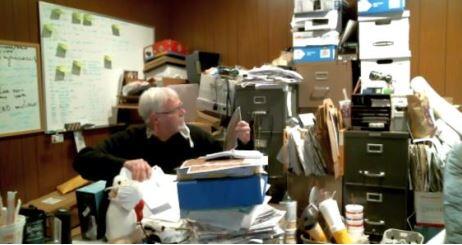Plan Your Studio Before You Build

[December 2020] A construction project can be a success, fun, or a source of unanticipated problems, even a disaster. Proper planning before you start can help make things go much more smoothly. Gordon Carter has the right ideas.
For most broadcast engineers the largest project they will be called to work on is probably a studio move or rebuild, followed by a transmitter move or replacement.
A successful project would be one completed on time, on budget, and working as desired. To ensure such a successful project requires in-depth planning, lots of patience, and a great deal of expertise.
In many cases the broadcast engineer will perform multiple functions, possibly including the design of one or more aspects of the project, supervising designers and contractors, and even building several portions of the project.
It Takes a Team
Actually, it is rare to find a single individual who can fill all these roles, so often a team is assembled to complete a project with the broadcast engineer called upon to lead this team, as he often has the best picture of the needs.
My goal here is to share some ideas and tips I have learned over the years to help others fill these roles. I will try to cover as much as possible, even though some parts of it may not be necessary for a given project.
While we are primarily talking about large projects (studio rebuild, transmitter move, etc.) many of the tips given in this discussion are applicable to smaller projects as well. In fact, applying these tips to even a very small project will tend to make the project run smoothly and help insure a successful completion without a lot of waste of time and money.
What is the Plan?
For any project, the very first and most important thing is to define what the project is.
The project definition should include such information as the scope of the work, what the completed project will include, estimated timeline, and the people or organizations that are responsible for various aspects of the project.
In the early stages of the project some of these factors may change. But the sooner you can lock in the details the better as any changes after the project begins will most likely raise the cost of the project and stretch the time to completion.
Document Everything!
Throughout the course of the project, everything should be in writing. Computer records are fine, but it is important that a record be kept of all changes. Changes can creep into documents during the course of a project, some of which may be incorrect and costly.
Each document should include an original date, date and short description of all changes, and the name of the person making the changes.
Additionally, a copy of each version of the documents should be kept because sometimes computer files can be altered and the “paper trail” changed. So, it is recommended that you be sure a “master file” is kept somewhere with limited and secured access.
By keeping such an accurate “paper trail” with this information you can determine when and where any changes took place – and whether or not they were approved and signed off on them by the proper person.
If the changes were not properly authorized you may have recourse to have it corrected at no cost to you or your company, even after the work has been done. (You may need to seek legal representation, but in the end, that could also save you a lot of money.)
Keep Reviewing the Project
Throughout the process, be constantly thinking about things you may have missed or overlooked.
Constantly review all documents. If you think you have everything in hand, take another look. You almost definitely do not have everything.
And, do not just review the documents in your specific area of responsibility, but look at all of them, even if it seems to become a bit overwhelming.

During this process do take frequent breaks.
Prolonged periods of intense concentration will make you tired, just like driving for long periods. It does not take long when you are looking at a lot of details in documents to glaze over and start missing things.
Frequent breaks and changes of your physical position and what you are doing will help keep you alert.
Do get others on your team to do the same. Having others review documents will almost always help identify potential issues before they can become big problems.
Consult with Experts
As mentioned earlier, it is unlikely you will be an expert in all aspects of the project.
Hence, the course of wisdom is to utilize consultants as necessary, as a good consultant will usually save you more than he costs. During the course of a project, you will also frequently need to use outside contractors.
Sometimes management is reluctant to spend the money for a consultant. If so, it may take some persuasion to convince them. Do not give up, as a good consultant will most likely give you better results than you can achieve on your own, as well as save you money.
Hire the Right Ones
At the same time, it is important to choose your contractors and consultants carefully.
First of all, make sure they are experienced in the type of work you need done. For instance, an electrician who has done nothing but residential work may not have the experience or know-how to deal with the special needs of broadcast or industrial work.
It is good to ask all prospective contractors or consultants for a list of references, especially references for projects similar to yours.
Then contact the references, and try to get them to be specific with the details of their experience with the contractor. Ask them if they know anyone else who has used that contractor, or possibly another one, for similar work. Repeat this until you are confident that you have a good picture of the contractor’s abilities and work.
Typically by the second or third layer of references you will find someone with a bad experience. Try to determine if the contractor sufficiently rectified the situation. Also, try to find if this was an isolated incident or typical of the way the contractor works.
Contracts
When it comes time to sign a contract with a consultant or contractor, make sure the agreement details the responsibilities of all parties involved.
If possible and appropriate, include some guarantee of performance of the final product. Be sure to include a clause that they will provide full documentation of all equipment provided or installed by them and documentation of system design if they are doing any of that.
If the equipment they are dealing with involves passwords or any setup beyond factory defaults, be sure they include passwords and configuration files for all equipment. (If the individual who did the project leaves the company, or the company goes out of existence, lack of this information could be very costly to replicate or recover.)
You Need to Be in Charge
When working with any outside help, remember that you are the client, and as such should have final say in all decisions.
It is important that you do not let someone from outside your company try to convince you he knows what is best for your company and take control. We will discuss this danger in more detail in a future installment.
It is essential for you know the primary contact person for the work and how to contact them quickly at each outside firm. Fast response on an urgent matter could save you a lot of wasted time and money.

During the project, take the time to watch the outside contractors closely, especially when they are working on critical parts of the project. Anyone can make a mistake, no matter how good they are.
The sooner a mistake is caught, the sooner it can be corrected – and at a lower cost. On the other hand, a missed error may take years to notice, and may cost you a lot of money and possibly lost air time.
Dealing With Changes
Few projects go 100% smoothly, so here is one final word about handling contractors: Make sure that any changes that are made from the approved plans during construction have been approved prior to being made and are recorded on an “as-built” plan for future reference.
Sometimes contractors do have a better way to accomplish things than the designer, based on their practical experience. This type of change should be approved and noted. However, sometimes the “better way” may not be appropriate for your specific situation and in these cases you should stick with the original plans.
If in doubt, have the contractor consult with the designer for approval before making the change.
Now, with contractors and consultants on board, it is time to determine exactly what will be built – and how – and get the various details laid out so everyone knows what is coming.
In our next installment, we will see how planning can prevent major problems and expenses with regard to the equipment you intend to purchase.
– – –
Gordon S. Carter, CPBE, CRB, CBNT was the Chief Engineer for WFMT, Chicago, one of the premier stations in the country. Now retired, Gordon is sharing his knowledge and experience with the industry.
Contact Gordon at: gordon@gcarter.us
